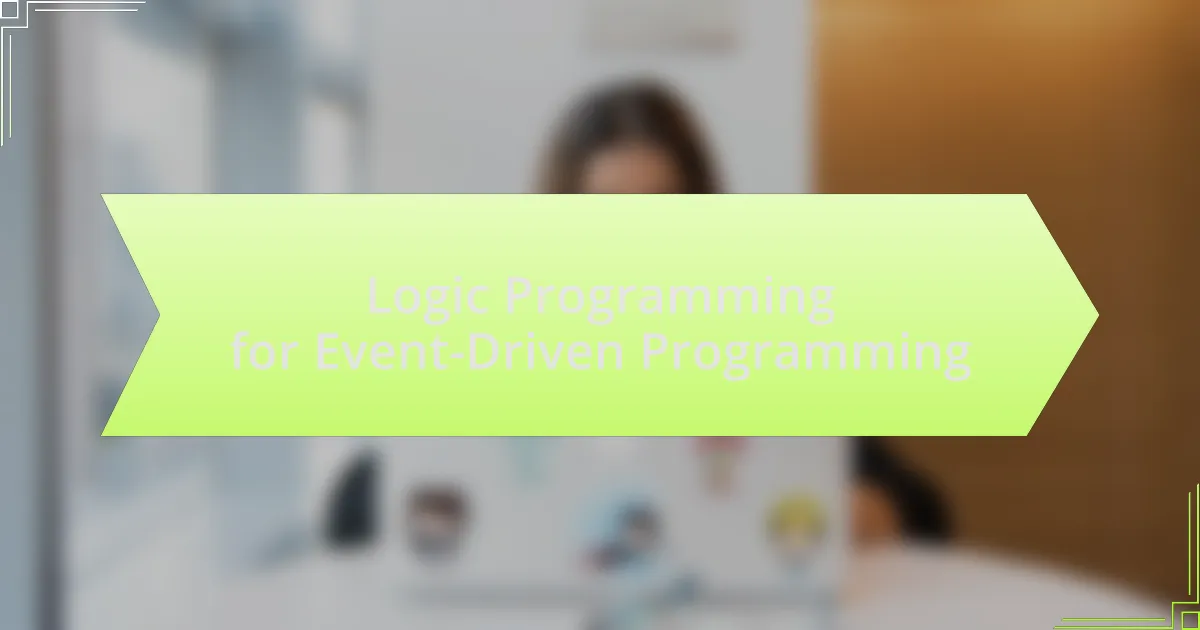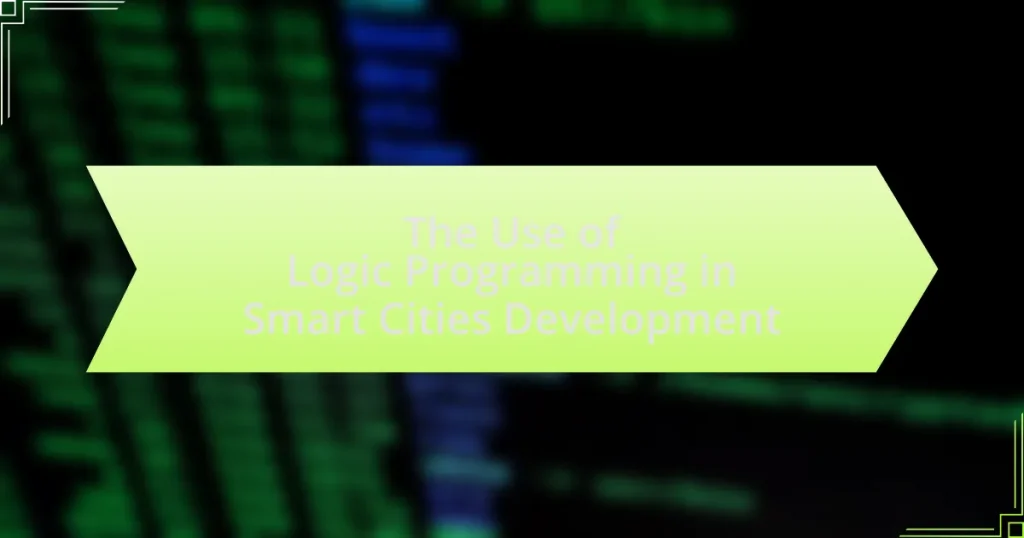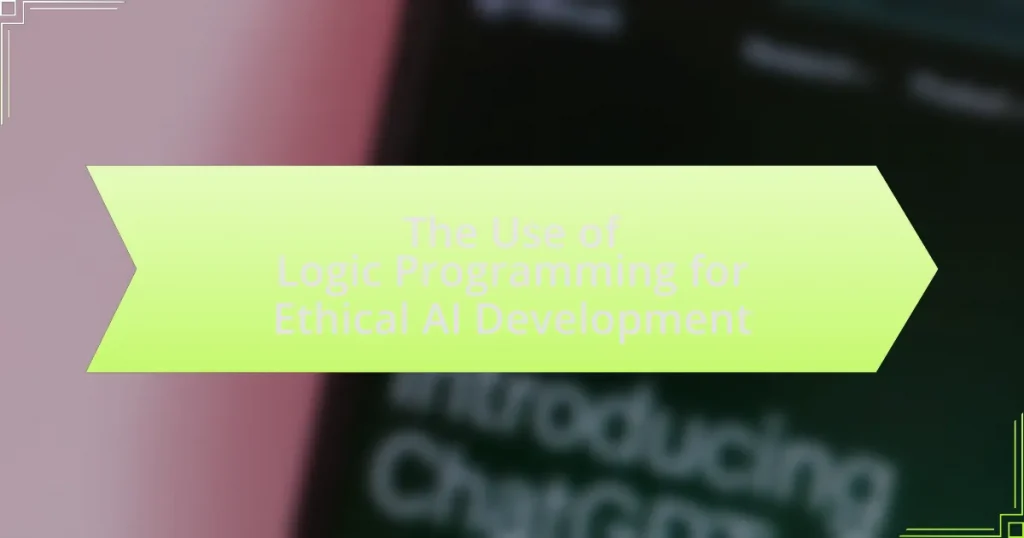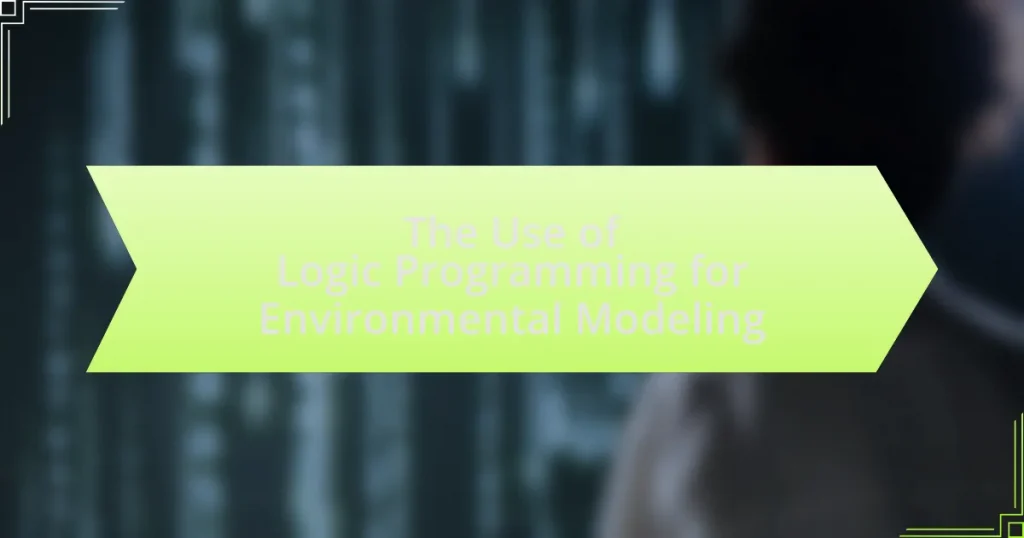Logic Programming for Event-Driven Programming is a paradigm that merges logic programming principles with event-driven models to enhance application responsiveness and flexibility. This article explores how logic programming enables declarative rule definition and dynamic event handling, improving maintainability and clarity in code. Key features include the use of predicates for event conditions, the advantages of declarative programming in simplifying event management, and the performance benefits derived from efficient problem-solving techniques. Additionally, it addresses common challenges and pitfalls in implementation, offering practical tips and best practices for optimizing logic programming in event-driven contexts.
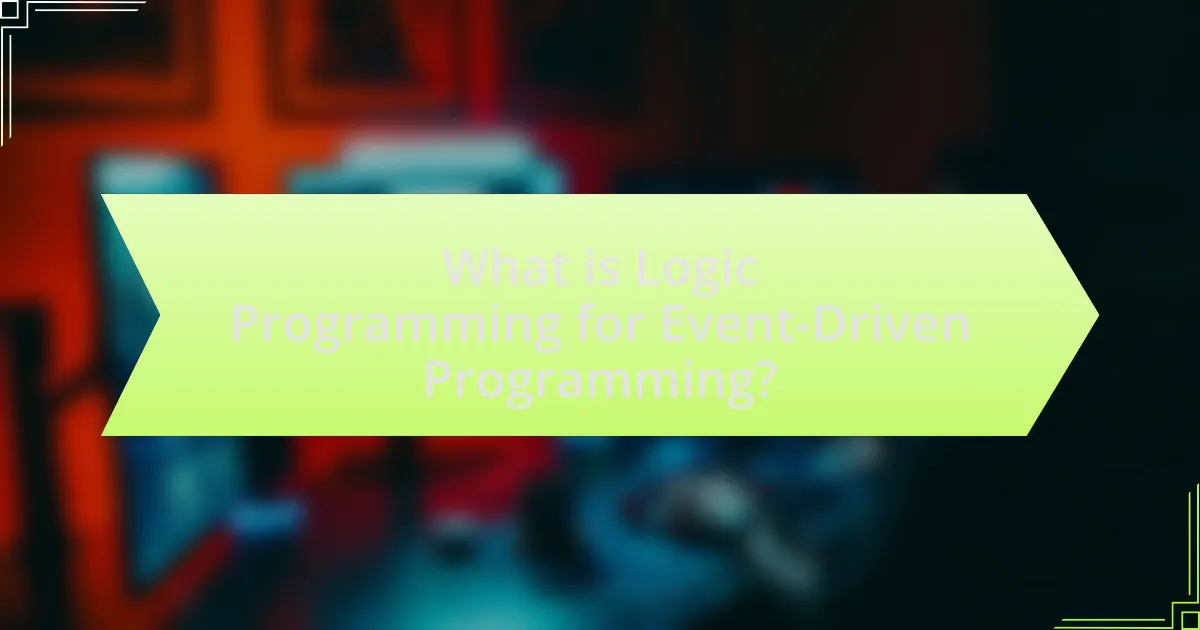
What is Logic Programming for Event-Driven Programming?
Logic programming for event-driven programming is a paradigm that combines the principles of logic programming with the event-driven model to facilitate the development of applications that respond to events. In this context, logic programming allows developers to define rules and relationships declaratively, enabling the system to infer actions based on the occurrence of specific events. This approach enhances the responsiveness and flexibility of applications, as it allows for dynamic handling of events through logical reasoning. For instance, Prolog, a well-known logic programming language, can be utilized to create event-driven systems where rules dictate how the application should react to various inputs or changes in state, thereby streamlining the development process and improving maintainability.
How does Logic Programming integrate with Event-Driven Programming?
Logic programming integrates with event-driven programming by enabling the specification of complex event handling rules through logical predicates and inference. In this integration, logic programming languages, such as Prolog, allow developers to define events and their associated actions declaratively, facilitating the dynamic response to events based on logical conditions. This approach enhances the flexibility and maintainability of event-driven systems, as rules can be modified without altering the underlying event handling infrastructure. For example, in a system where user interactions trigger events, logic programming can be used to define conditions under which specific actions should occur, streamlining the process of event management and improving responsiveness.
What are the fundamental principles of Logic Programming?
The fundamental principles of Logic Programming include the use of facts, rules, and queries to derive conclusions. Logic Programming is based on formal logic, where facts represent known information, rules define relationships and infer new information, and queries are used to extract information from the knowledge base. This paradigm allows for declarative programming, where the focus is on what the program should accomplish rather than how to achieve it. The proof of its effectiveness is evident in systems like Prolog, which utilizes these principles to solve complex problems through logical inference and backtracking.
How does Event-Driven Programming function in software development?
Event-Driven Programming functions in software development by allowing software components to respond to events or changes in state, enabling a more dynamic and interactive user experience. In this paradigm, the flow of the program is determined by events such as user actions, sensor outputs, or messages from other programs, rather than a predetermined sequence of instructions. This approach is particularly effective in graphical user interfaces and real-time systems, where responsiveness is crucial. For instance, in web applications, user interactions like clicks or form submissions trigger specific event handlers, which execute the corresponding code to update the interface or process data. This model enhances modularity and scalability, as components can be developed and maintained independently, leading to more efficient software development practices.
What are the key features of Logic Programming in an event-driven context?
The key features of Logic Programming in an event-driven context include declarative problem-solving, non-procedural execution, and the ability to handle dynamic events through rules and facts. Declarative problem-solving allows developers to specify what the program should accomplish without detailing how to achieve it, which aligns well with event-driven paradigms that react to user inputs or system events. Non-procedural execution enables the system to derive conclusions based on logical relationships rather than following a strict sequence of commands, facilitating more flexible and responsive applications. Additionally, Logic Programming can dynamically respond to events by updating its knowledge base with new facts and rules, allowing for real-time decision-making and adaptability in complex systems. These features enhance the efficiency and effectiveness of event-driven programming by leveraging logical inference and rule-based reasoning.
How does declarative programming influence event handling?
Declarative programming influences event handling by allowing developers to specify what the program should accomplish without detailing how to achieve it. This abstraction simplifies the event handling process, as developers can focus on defining the desired outcomes and conditions for events rather than the procedural steps to manage them. For instance, in frameworks like React, declarative paradigms enable developers to describe UI states in response to events, leading to more maintainable and readable code. This approach reduces the complexity associated with managing state changes and event listeners, as the framework handles the underlying implementation details, thus enhancing productivity and reducing bugs.
What role do predicates play in event-driven applications?
Predicates serve as essential components in event-driven applications by defining conditions that trigger specific actions or responses. In this context, predicates evaluate the state of events or data, determining whether certain criteria are met before executing corresponding event handlers. For instance, in a system monitoring application, a predicate might check if a temperature reading exceeds a threshold, prompting an alert if the condition is true. This logical evaluation ensures that actions are only taken when necessary, optimizing resource use and enhancing application responsiveness.
What advantages does Logic Programming provide for Event-Driven Programming?
Logic Programming enhances Event-Driven Programming by enabling declarative problem-solving and facilitating complex event handling. This approach allows developers to specify what the program should accomplish without detailing how to achieve it, leading to clearer and more maintainable code. For instance, Prolog, a prominent logic programming language, allows for concise representation of rules and relationships, which can simplify the management of event conditions and responses. Additionally, the inherent backtracking capabilities of logic programming can efficiently handle multiple event scenarios, ensuring that the most relevant event handlers are triggered based on the defined logic. This efficiency is particularly beneficial in applications requiring real-time responses to dynamic events, as it reduces the complexity of event management and enhances responsiveness.
How does it enhance code maintainability and readability?
Logic programming enhances code maintainability and readability by promoting declarative programming principles, which allow developers to express logic without detailing control flow. This abstraction simplifies understanding the code’s intent, making it easier for developers to read and modify. For instance, in event-driven programming, using logic programming can reduce boilerplate code and clarify event handling, as seen in frameworks like Prolog, where rules and facts are clearly defined. This clarity leads to fewer errors and facilitates collaboration among developers, as evidenced by studies showing that well-structured code can reduce maintenance costs by up to 40%.
What performance benefits can be expected from using Logic Programming?
Logic Programming offers significant performance benefits, including improved efficiency in problem-solving and enhanced expressiveness in representing complex relationships. These benefits arise from the declarative nature of Logic Programming, which allows programmers to focus on what the program should accomplish rather than how to achieve it. This leads to more concise code and easier maintenance. Additionally, Logic Programming systems often utilize advanced optimization techniques, such as constraint satisfaction and backtracking, which can significantly reduce the search space and execution time for complex queries. For instance, Prolog, a well-known Logic Programming language, demonstrates these advantages through its ability to handle large datasets and perform complex reasoning tasks efficiently, as evidenced by its application in artificial intelligence and database querying.
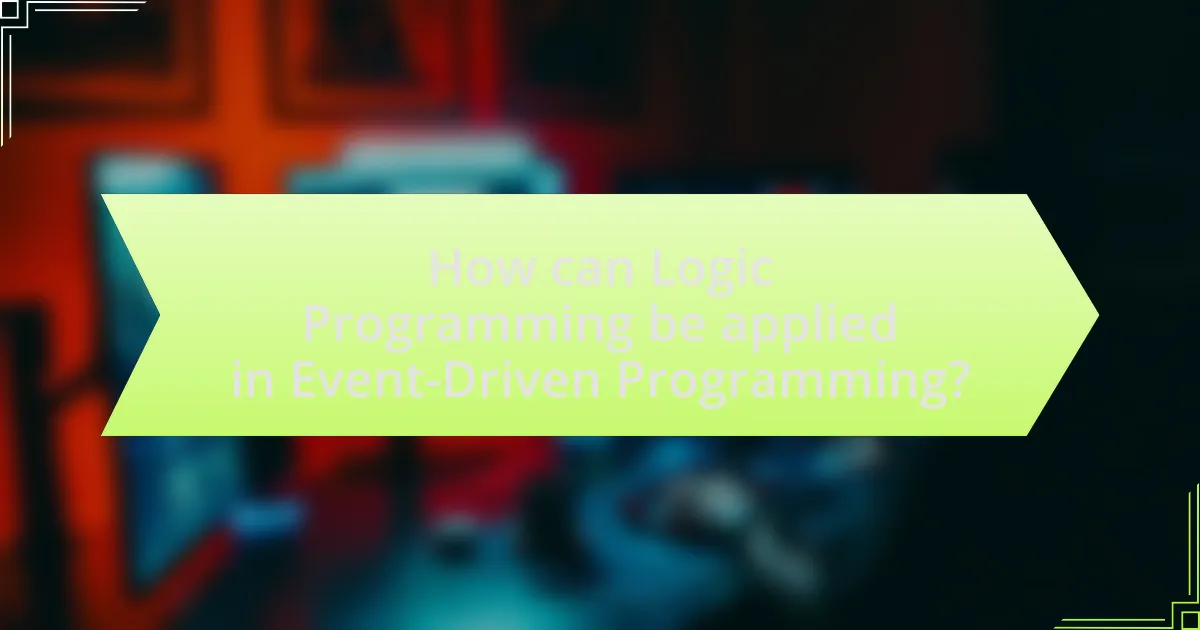
How can Logic Programming be applied in Event-Driven Programming?
Logic programming can be applied in event-driven programming by using logical rules to define event handling and state transitions. In this context, logic programming languages, such as Prolog, allow developers to specify conditions under which events should trigger specific actions, enabling a declarative approach to event management. This method enhances clarity and maintainability, as the logic can be easily modified without altering the underlying event-driven architecture. For instance, in a system where user interactions generate events, logic programming can succinctly express the relationships between events and their corresponding handlers, facilitating dynamic responses based on the current state of the application.
What are common use cases for Logic Programming in event-driven systems?
Common use cases for Logic Programming in event-driven systems include rule-based systems, automated reasoning, and complex event processing. Rule-based systems utilize logic programming to define rules that trigger specific actions based on events, enabling dynamic responses to changing conditions. Automated reasoning employs logic programming to infer conclusions from a set of premises, facilitating decision-making processes in real-time applications. Complex event processing leverages logic programming to analyze and respond to patterns in event streams, allowing for the detection of significant occurrences and the execution of corresponding actions. These applications demonstrate the effectiveness of logic programming in managing and responding to events in a structured and efficient manner.
How is Logic Programming utilized in web applications?
Logic programming is utilized in web applications primarily for reasoning and decision-making processes. It enables developers to define rules and relationships that can be queried, allowing for dynamic content generation and complex data manipulation. For instance, Prolog, a well-known logic programming language, can be integrated into web applications to handle tasks such as natural language processing, expert systems, and database querying. This approach enhances the application’s ability to respond to user inputs and events by deriving conclusions based on the defined logic, thereby improving interactivity and user experience.
What examples exist in real-time data processing?
Examples of real-time data processing include financial transaction monitoring, where systems analyze transactions as they occur to detect fraud, and social media sentiment analysis, which evaluates user posts in real-time to gauge public opinion. In the context of financial services, companies like PayPal utilize real-time processing to flag suspicious activities instantly, enhancing security. Similarly, platforms like Twitter employ real-time data processing to analyze trending topics and user sentiments, allowing for immediate insights into public discourse. These examples demonstrate the critical role of real-time data processing in various industries, enabling timely decision-making and responsiveness.
What tools and frameworks support Logic Programming for Event-Driven Programming?
Prolog is a primary tool that supports Logic Programming for Event-Driven Programming, enabling developers to define rules and relationships for event handling. Additionally, frameworks like SWI-Prolog and ECLiPSe provide robust environments for implementing logic-based event-driven systems. These tools facilitate the integration of logical reasoning with event-driven architectures, allowing for dynamic response to events based on defined logic. The use of Prolog in event-driven contexts has been documented in various applications, demonstrating its effectiveness in managing complex event interactions.
Which programming languages are best suited for this approach?
Prolog and Mercury are the programming languages best suited for logic programming in event-driven programming. Prolog excels in symbolic reasoning and pattern matching, making it ideal for applications that require complex event handling and decision-making. Mercury, with its strong type system and efficiency, enhances performance in logic-based applications, particularly in scenarios involving concurrent event processing. Both languages leverage logical constructs to manage events effectively, supporting the development of robust event-driven systems.
What libraries facilitate Logic Programming in event-driven environments?
Libraries that facilitate Logic Programming in event-driven environments include Prolog, ECLiPSe, and SWI-Prolog. Prolog is a well-known logic programming language that supports event-driven programming through its ability to handle backtracking and unification, making it suitable for complex event handling. ECLiPSe extends Prolog’s capabilities with features for constraint logic programming, allowing for more sophisticated event-driven applications. SWI-Prolog offers a rich set of libraries and tools for integrating logic programming with event-driven paradigms, including support for web applications and multi-threading, which enhances its utility in real-time event processing.
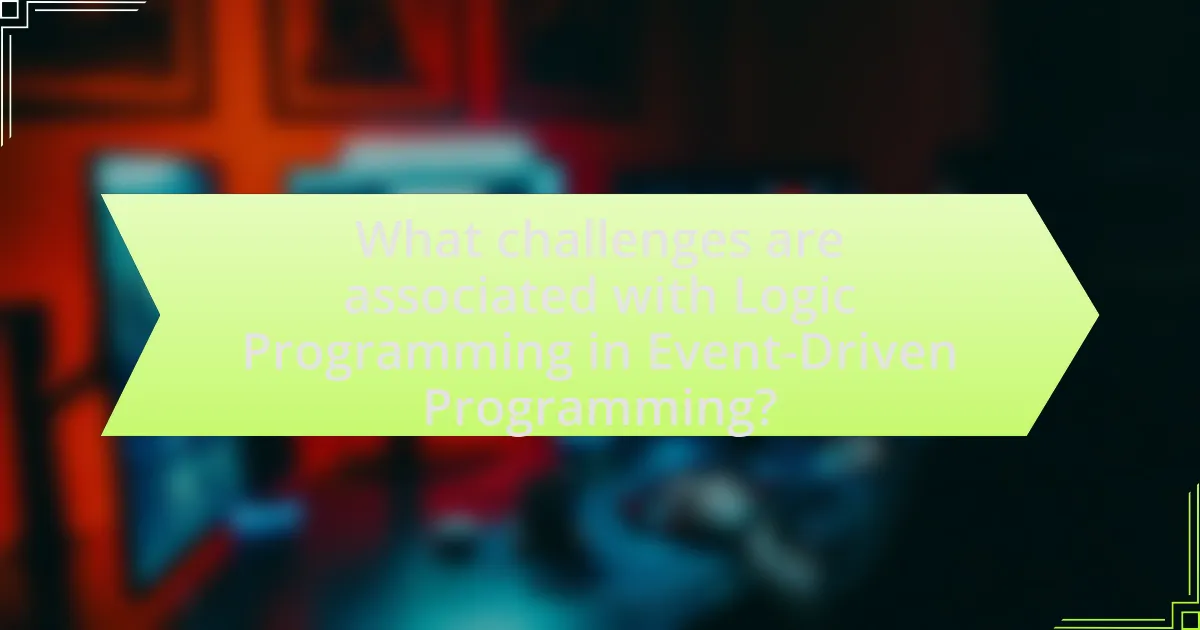
What challenges are associated with Logic Programming in Event-Driven Programming?
Logic Programming in Event-Driven Programming faces several challenges, primarily related to performance, state management, and integration complexity. Performance issues arise because logic programming often involves backtracking and unification, which can be computationally expensive in real-time event-driven systems. State management becomes problematic as logic programming typically emphasizes declarative paradigms, making it difficult to maintain and update the state in response to asynchronous events. Additionally, integrating logic programming with existing event-driven frameworks can lead to complexity, as the paradigms may not align seamlessly, requiring additional effort to bridge the gap between the two approaches.
What are the common pitfalls when implementing Logic Programming?
Common pitfalls when implementing Logic Programming include misunderstanding the declarative nature of the paradigm, leading to inefficient problem-solving strategies. Developers often attempt to apply imperative programming techniques, which can result in convoluted code and performance issues. Additionally, improper handling of backtracking can cause excessive computation time, as failing to optimize search strategies may lead to exploring unnecessary paths. Furthermore, a lack of familiarity with the underlying logic can lead to incorrect assumptions about the behavior of the program, resulting in bugs and unexpected outcomes. These pitfalls are well-documented in literature, such as “Logic Programming: A Primer” by Michael A. Covington, which emphasizes the importance of understanding the unique characteristics of Logic Programming to avoid these common mistakes.
How can developers avoid performance issues?
Developers can avoid performance issues by implementing efficient algorithms and optimizing code execution. Efficient algorithms reduce the time complexity of operations, which directly impacts performance. For instance, using a hash table for lookups instead of a list can decrease search time from O(n) to O(1). Additionally, optimizing code execution involves minimizing resource-intensive operations, such as reducing the number of database queries or using asynchronous programming to handle I/O operations without blocking the main thread. These practices are supported by studies showing that optimized code can lead to significant performance improvements, with some applications experiencing up to a 50% reduction in response time when best practices are applied.
What debugging strategies are effective for Logic Programming?
Effective debugging strategies for Logic Programming include using trace debugging, constraint satisfaction techniques, and employing test cases. Trace debugging allows developers to follow the execution of logic rules step-by-step, making it easier to identify where the logic fails. Constraint satisfaction techniques help in narrowing down the possible values that variables can take, thus simplifying the debugging process. Additionally, creating comprehensive test cases ensures that various scenarios are covered, allowing for the detection of logical errors early in the development process. These strategies are validated by their widespread use in the field, demonstrating their effectiveness in identifying and resolving issues in Logic Programming.
How can developers effectively troubleshoot Logic Programming in event-driven applications?
Developers can effectively troubleshoot Logic Programming in event-driven applications by utilizing systematic debugging techniques and leveraging logging mechanisms. Systematic debugging involves isolating components to identify the source of errors, while logging provides real-time insights into application behavior, allowing developers to trace the flow of events and data. For instance, implementing structured logging can help capture relevant context, such as event types and state changes, which aids in diagnosing issues. Additionally, using tools like debuggers and profilers can enhance visibility into the execution of logic rules, enabling developers to pinpoint inefficiencies or incorrect logic paths. These methods are supported by best practices in software development, which emphasize the importance of clear error reporting and maintaining a robust testing framework to catch issues early in the development cycle.
What best practices should be followed for efficient event handling?
Efficient event handling requires implementing best practices such as minimizing event listener attachment, using event delegation, and debouncing or throttling events. Minimizing event listener attachment reduces memory usage and improves performance by limiting the number of active listeners. Event delegation allows a single listener to manage events for multiple child elements, which simplifies code and enhances efficiency. Debouncing or throttling controls the rate at which event handlers are executed, preventing performance degradation during high-frequency events like scrolling or resizing. These practices are supported by performance studies indicating that optimized event handling can significantly enhance application responsiveness and resource management.
How can testing be optimized for Logic Programming in this context?
Testing can be optimized for Logic Programming in the context of Event-Driven Programming by employing automated testing frameworks that specifically cater to the declarative nature of logic programming. These frameworks, such as SWI-Prolog’s testing library, allow for the creation of test cases that can automatically verify the correctness of logical assertions and rules without requiring extensive manual intervention.
Additionally, utilizing property-based testing can enhance the robustness of logic programs by generating a wide range of input scenarios to ensure that the logic holds under various conditions. This method has been shown to uncover edge cases that traditional testing might miss, thereby improving overall reliability.
Furthermore, integrating continuous integration (CI) tools can streamline the testing process, ensuring that logic programs are automatically tested with each code change, which helps maintain code quality and reduces the likelihood of introducing errors. This approach is supported by the fact that automated testing can significantly reduce the time and effort required for manual testing, as evidenced by studies indicating that automated tests can execute hundreds of test cases in a fraction of the time it takes to run them manually.
What practical tips can enhance the use of Logic Programming in Event-Driven Programming?
To enhance the use of Logic Programming in Event-Driven Programming, developers should focus on integrating declarative paradigms with event handling mechanisms. This can be achieved by utilizing logic-based frameworks that support event-driven architectures, such as Prolog or Mercury, which allow for clear expression of rules and relationships. Additionally, employing a clear separation of concerns by defining event handlers as logical predicates can improve maintainability and readability of the code.
Furthermore, leveraging backtracking capabilities inherent in logic programming can facilitate complex event resolution scenarios, allowing the system to explore multiple potential outcomes based on event conditions. This approach has been validated in various applications, demonstrating improved responsiveness and adaptability in dynamic environments. For instance, research has shown that combining logic programming with event-driven systems can lead to more efficient state management and event processing, as evidenced by case studies in intelligent agent systems.
How can developers ensure scalability in their applications?
Developers can ensure scalability in their applications by implementing microservices architecture, which allows for independent scaling of components. This approach enables teams to deploy, manage, and scale services individually based on demand, improving resource utilization and reducing bottlenecks. According to a study by the National Institute of Standards and Technology, microservices can enhance system resilience and scalability by allowing for horizontal scaling, where additional instances of services can be added as needed to handle increased load.
What design patterns are beneficial for Logic Programming in event-driven systems?
The design patterns beneficial for Logic Programming in event-driven systems include the Observer pattern, the Command pattern, and the Event Sourcing pattern. The Observer pattern facilitates the subscription of multiple components to events, allowing them to react to changes in state without tight coupling. The Command pattern encapsulates requests as objects, enabling parameterization and queuing of operations, which is essential for handling events asynchronously. The Event Sourcing pattern ensures that state changes are stored as a sequence of events, providing a reliable audit trail and enabling the reconstruction of past states. These patterns enhance modularity, maintainability, and scalability in event-driven architectures, making them effective for Logic Programming applications.
